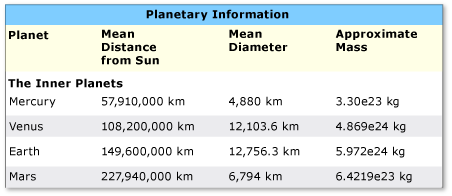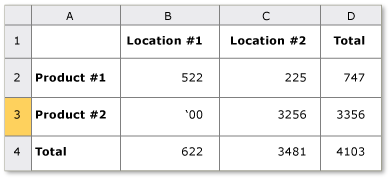Implementing the UI Automation Table Control Pattern
Note
This documentation is intended for .NET Framework developers who want to use the managed UI Automation classes defined in the System.Windows.Automation namespace. For the latest information about UI Automation, see Windows Automation API: UI Automation.
This topic introduces guidelines and conventions for implementing ITableProvider, including information about properties, methods, and events. Links to additional references are listed at the end of the overview.
The TablePattern control pattern is used to support controls that act as containers for a collection of child elements. The children of this element must implement ITableItemProvider and be organized in a two-dimensional logical coordinate system that can be traversed by row and column. This control pattern is analogous to IGridProvider, with the distinction that any control implementing ITableProvider must also expose a column and/or row header relationship for each child element. For examples of controls that implement this control pattern, see Control Pattern Mapping for UI Automation Clients.
Implementation Guidelines and Conventions
When implementing the Table control pattern, note the following guidelines and conventions:
Access to the content of individual cells is through a two-dimensional logical coordinate system or array provided by the required concurrent implementation of IGridProvider.
A column or row header can be contained within a table object or be a separate header object that is associated with a table object.
Column and row headers may include both a primary header as well as any supporting headers.
Note
This concept becomes evident in a Microsoft Excel spreadsheet where a user has defined a "First name" column. This column now has two headers—the "First name" header defined by the user and the alphanumeric designation for that column assigned by the application.
- See Implementing the UI Automation Grid Control Pattern for related grid functionality.
 Example of a Table with Complex Column Headers
Example of a Table with Complex Column Headers
 Example of a Table with Ambiguous RowOrColumnMajor Property
Example of a Table with Ambiguous RowOrColumnMajor Property
Required Members for ITableProvider
The following properties and methods are required for the ITableProvider interface.
| Required members | Member type | Notes |
|---|---|---|
| RowOrColumnMajor | Property | None |
| GetColumnHeaders | Method | None |
| GetRowHeaders | Method | None |
This control pattern has no associated events.
Exceptions
This control pattern has no associated exceptions.
See also
- UI Automation Control Patterns Overview
- Support Control Patterns in a UI Automation Provider
- UI Automation Control Patterns for Clients
- Implementing the UI Automation TableItem Control Pattern
- Implementing the UI Automation Grid Control Pattern
- UI Automation Tree Overview
- Use Caching in UI Automation